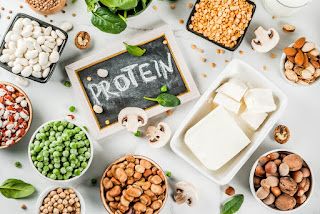Plant-based meats
are booming on supermarket shelves, with our latest Australian-first study showing that the
category has grown a massive five-fold in number - up 429% - since just 2015. There are now a staggering 137
products on the shelf, ranging from ‘bleeding’ burgers, to nut roasts and plant-based tuna.
This research was published in October in the International journal Nutrients* and was presented at the Nutrition
Society of Australia conference in Newcastle in early December. Data was collected from the four major
Australian supermarkets, comparing plant-based meats to their animal-based equivalents.
Researchers found that plant-based meats were generally lower in kilojoules, fats and
protein and higher in carbohydrates and dietary fibre in comparison to their traditional
animal-based meats.
One third of the products captured were made with protein-rich legumes such as beans and
lentils, while 20% of plant-based burgers contained whole grains like
brown rice and quinoa. GLNC Nutrition Manager Felicity Curtain points to these
findings as opportunities to bridge gaps in the Australian diet.
“We know convenience is a major barrier to eating both whole grains and
legumes, so if you’re looking at plant-based meats, choosing one made with
these ingredients may be an easy step to getting more of these short-fall foods
into your diet.”
But there is room for improvement in the category, with plant-based
mince six times higher in sodium than its traditional counterpart, and less
than a quarter of products fortified with nutrients like Vitamin B12, Iron, and
Zinc, which are naturally contained in many animal-based meats.
Based on these findings, GLNC are calling for more guidance in the
development of plant-based meats, alongside input from nutrition
professionals to ensure consumers can make healthy choices at the supermarket
shelf.
The plant-protein trend is predicted to continue well into 2020 and
beyond; the impacts of which may be a ‘win-win’ for our health and the environment.
“Plant-based foods like beans, legumes, tofu, nuts and seeds, and
whole grains are packed with nutrition, and have a smaller environmental impact
compared to animal products,” said Ms Curtain.
Although some of the plant-based meats contain valuable
nutrients from the whole grain and legume ingredients and offer a convenient
option, it's also beneficial to choose protein-rich
whole foods on occasion too. Enjoying half a cup, or 100g, of beans, peas
or lentils provides a valuable protein boost.
Alternatively,
making your own plant-based burgers with a variety of whole grains
and legumes is an excellent choice. Take a look at just how easy it is by
trying our delicious Black Bean Burgers or McKenzies Supergrain Burgers for dinner tonight!
Reference
*Curtain, F.;
Grafenauer, S. Plant-Based Meat Substitutes in the Flexitarian Age: An Audit of
Products on Supermarket Shelves. Nutrients 2019, 11, 2603. https://doi.org/10.3390/nu11112603





